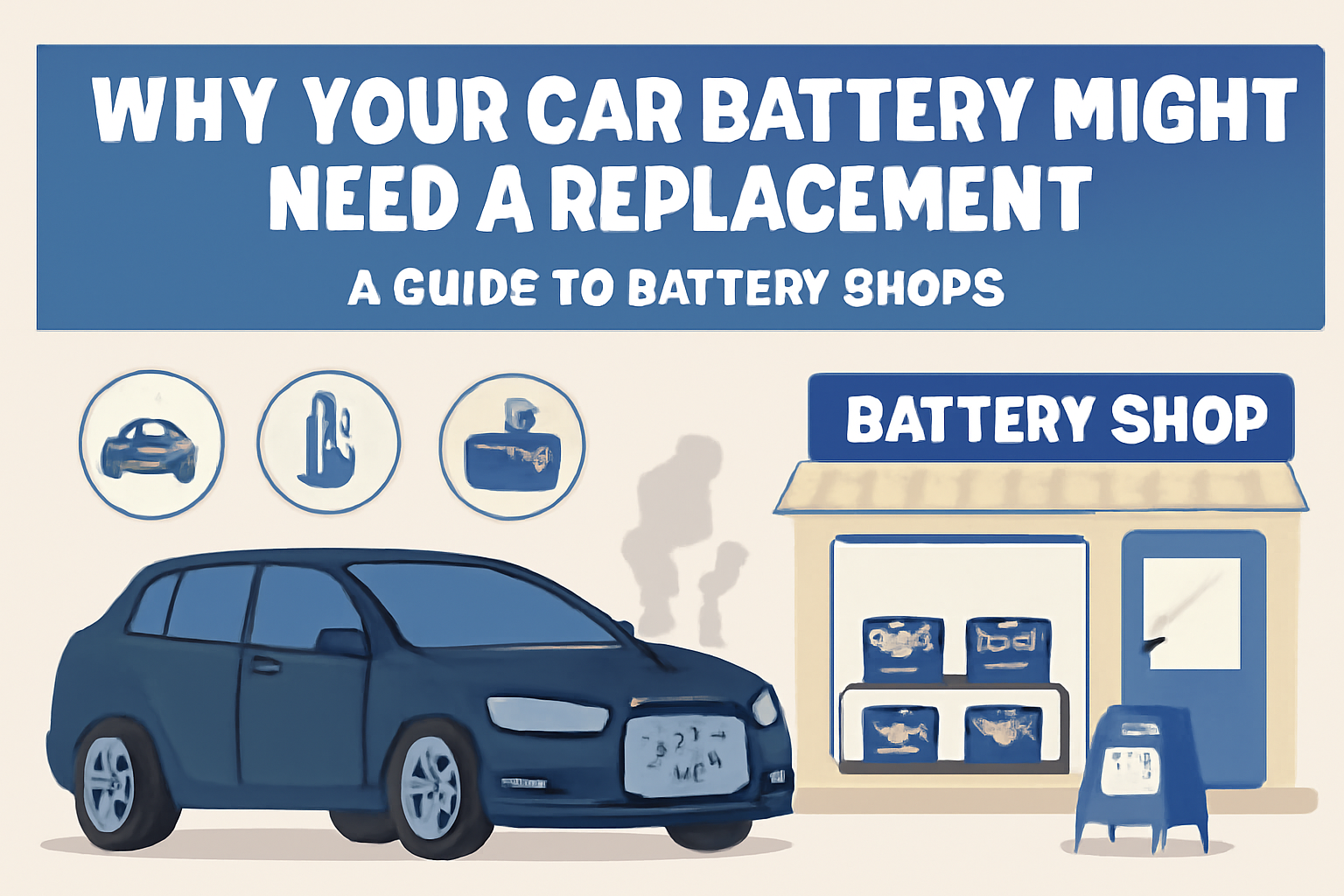Why Your Car Battery Might Need a Replacement: A Guide to Battery Shops

Why Your Car Battery Might Need a Replacement: A Guide to Battery Shops
Your car battery is one of the most important components of your vehicle, providing the necessary power to start the engine and keep all electrical systems running smoothly. When your battery is no longer working as efficiently as it should, it can lead to a variety of issues, ranging from trouble starting your car to complete breakdowns. In this guide, we will explore the common signs that indicate your car battery might need replacing and how to find the right battery shop to get the job done.
Understanding the Role of Your Car Battery
The primary function of your car battery is to provide electrical energy to start the engine. Once the engine is running, the alternator takes over, supplying power to the vehicle’s electrical systems and recharging the battery. In addition to starting the car, the battery also powers lights, the radio, and various other electronic components while the vehicle is off.
A healthy battery ensures that your car runs smoothly and can be started easily every time you need it. However, over time, batteries lose their capacity to hold a charge, which can result in a number of issues. Understanding the role your battery plays in your car will help you recognize when it might be time for a replacement.
Signs You Need to Replace Your Car Battery
There are several indicators that suggest your car battery is no longer functioning as it should. Here are the most common signs:
- Dim or Flickering Lights
If you notice that your headlights or interior lights are dimming, flickering, or seem to be fading in and out, it could be a sign that your battery is losing its charge. A weak battery can struggle to provide the necessary power for electrical systems, causing the lights to behave erratically. - Slow Engine Crank
If your car struggles to start or the engine cranks slowly when you turn the key, it might be because the battery no longer has enough power to turn the engine over. This is one of the earliest and most noticeable signs that your battery may need replacing. - Check Engine Light or Battery Warning Light
Modern cars are equipped with sophisticated computer systems that can detect issues with your battery. If the check engine light or battery warning light appears on your dashboard, it may be an indication that there’s a problem with your battery or charging system. It’s important not to ignore these warning lights. - Corroded or Leaking Battery Terminals
Corrosion on the battery terminals is a clear sign that your battery is past its prime. If you notice a white, ashy substance around the battery posts or see any signs of leakage, it’s time to take a closer look. Corrosion can prevent the battery from charging properly and may lead to a complete failure if left unaddressed. - Old Battery
Car batteries typically last between three to five years, depending on factors like climate and driving conditions. If your battery is older than that, it may be time to replace it, even if you don’t notice any immediate issues. Regular battery maintenance and periodic testing can help you avoid an unexpected breakdown. - Frequent Jump Starts
If you frequently need to jump-start your car, it’s a clear sign that your battery isn’t holding a charge properly. While jump-starting a car can be a quick fix, relying on it regularly is a temporary solution that masks a deeper issue with the battery.
How to Find a Car Battery Shop Near You
When you notice any of the above symptoms, it’s essential to find a reliable place to have your battery inspected and replaced. One convenient option is to search for a car battery shop near me. A local battery shop will be able to offer quick diagnostics, battery replacement services, and advice on the best replacement battery for your vehicle.
Visiting a local shop provides the added benefit of personalized service. Many car battery shops will not only check your battery for signs of wear but also assess the overall health of your vehicle’s charging system. This ensures that the root cause of the battery issue is addressed, rather than simply replacing the battery without solving any underlying problems.
Factors to Consider When Choosing a Car Battery Shop
Not all battery shops are created equal, so it’s important to choose a reputable one. Here are a few factors to consider:
- Experience and Reputation
Look for a shop with a solid reputation and years of experience in the industry. Experienced technicians will have the knowledge and expertise to diagnose battery issues accurately and efficiently. - Range of Battery Options
A good car battery shop should offer a variety of battery brands and types to suit different vehicles. Whether you need a standard lead-acid battery, an AGM (absorbed glass mat) battery, or a more specialized option, the shop should have multiple choices to fit your needs. - Warranty and Return Policy
Always ask about the warranty and return policy when purchasing a new battery. A quality shop will stand behind their products and offer a reasonable warranty period. This gives you peace of mind knowing that you’re covered in case the battery fails prematurely. - Customer Service
Choose a shop that prioritizes customer service. A friendly, knowledgeable team can help you make informed decisions about your battery replacement and answer any questions you might have. - Price and Payment Options
While price shouldn’t be the only consideration, it’s always wise to compare prices at different battery shops to ensure you’re getting a fair deal. Additionally, check if the shop offers financing or payment plans in case the cost of the battery replacement is higher than expected.
How to Maintain Your Car Battery
To extend the life of your battery and avoid premature failure, regular maintenance is key. Here are some tips to help you care for your battery:
- Keep the Battery Clean
Dirt and debris can accumulate around the battery terminals, leading to corrosion and poor contact. Clean the terminals periodically with a battery terminal cleaner or a mixture of baking soda and water to keep them in good condition. - Inspect the Battery Regularly
Make it a habit to check the battery’s condition every few months. Look for signs of corrosion, leaks, or any physical damage. If you’re unsure how to inspect the battery, ask your mechanic to do it during routine maintenance. - Test the Battery Voltage
Testing the battery voltage is a simple way to determine if the battery is holding a charge properly. Many auto parts stores offer free battery testing, or you can ask a mechanic to perform the test during an oil change. - Avoid Short Trips
Short trips can drain your battery more quickly, as the alternator doesn’t have enough time to recharge it fully. If possible, try to take longer drives to give the alternator a chance to keep the battery charged. - Turn Off Electrical Components When Not in Use
Leaving your car’s lights, radio, or other electrical systems on when the engine is off can put unnecessary strain on the battery. Always turn off all electronics when you leave the car.
Conclusion
Your car battery is essential for the smooth operation of your vehicle, and understanding the signs of battery failure can save you from being stranded on the road. If you notice any of the symptoms mentioned above, don’t hesitate to visit a car battery shop near me for an inspection and potential replacement. Regular maintenance and prompt replacement can extend the life of your battery and keep your car running smoothly.
For more information on battery replacement and maintenance, visit https://batteryexpress.com.my.
